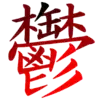鬱
| ||||||||
Translingual
| Stroke order | |||
|---|---|---|---|
 | |||
| Stroke order | |||
|---|---|---|---|
 | |||
Han character
鬱 (Kangxi radical 192, 鬯+19, 29 strokes, cangjie input 木木月山竹 (DDBUH), four-corner 44722, composition ⿳⿲木缶木冖⿰鬯彡)
References
- Kangxi Dictionary: page 1458, character 18
- Dai Kanwa Jiten: character 45671
- Dae Jaweon: page 1990, character 22
- Hanyu Da Zidian (first edition): volume 2, page 858, character 12
- Unihan data for U+9B31
Chinese
| trad. | 鬱 | |
|---|---|---|
| simp. | 郁* | |
| alternative forms | ||
Glyph origin
| Historical forms of the character 鬱 | |||
|---|---|---|---|
| Shang | Western Zhou | Warring States | Shuowen Jiezi (compiled in Han) |
| Oracle bone script | Bronze inscriptions | Qin slip script | Small seal script |
 |
 |
 |
 |
Originally ideogrammic compound (會意/会意) : 林 (“forest”) + 大 (“person”) + 勹.
Now phono-semantic compound (形聲/形声, OC *qud) : semantic 林 (“forest”) + phonetic 𩰪 ().
Pronunciation
Definitions
鬱
- lush; luxuriant; exuberant; dense; thick
- various; abundant; profuse
- deep; obscure; profound
- to gather; to stagnate; to become stagnant
- depressed; gloomy; moody
- melancholy; depression
- to begrudge; to resent; to feel aggrieved
- hot air (rising); steam
- a kind of plum
- name of a god
- tall and big
- putrid; putrefied
- tulip; fragrant grass
- (~水) name for a branch of the Pearl River, including the You River, Yu River and the Xun River in Guangxi, as well as the Xi River downstream in Guangdong
- (~郡) name of an ancient Chinese prefecture
- a surname
Compounds
- 伊鬱/伊郁
- 勃鬱/勃郁
- 坱鬱/坱郁
- 壹鬱/壹郁
- 怏鬱/怏郁
- 怫鬱/怫郁
- 悒鬱/悒郁 (yìyù)
- 悒鬱不忿/悒郁不忿
- 悒鬱寡歡/悒郁寡欢 (yìyùguǎhuān)
- 憂鬱/忧郁 (yōuyù)
- 憂鬱症/忧郁症 (yōuyùzhèng)
- 抗憂鬱藥/抗忧郁药
- 抑鬱/抑郁 (yìyù)
- 抑鬱寡歡/抑郁寡欢
- 氤鬱/氤郁
- 氣鬱/气郁
- 沉鬱/沉郁 (chényù)
- 沉鬱頓挫/沉郁顿挫
- 泱鬱/泱郁
- 湮鬱/湮郁
- 滃鬱/滃郁
- 漚鬱/沤郁
- 神荼鬱壘/神荼郁垒
- 積鬱/积郁 (jīyù)
- 紆鬱/纡郁
- 肝鬱/肝郁
- 芬鬱/芬郁 (fēnyù)
- 茀鬱/茀郁
- 蒼鬱/苍郁 (cāngyù)
- 蓊鬱/蓊郁 (wěngyù)
- 蔥鬱/葱郁 (cōngyù)
- 躁鬱症/躁郁症 (zàoyùzhèng)
- 陰鬱/阴郁 (yīnyù)
- 鞅鬱/鞅郁
- 馥鬱/馥郁 (fùyù)
- 鬱伊/郁伊
- 鬱勃/郁勃 (yùbó)
- 鬱卒/郁卒 (yùzú)
- 鬱堙不偶/郁堙不偶
- 鬱塞/郁塞
- 鬱壘/郁垒 (Yùlǜ)
- 鬱律/郁律
- 鬱悒/郁悒
- 鬱悶/郁闷 (yùmèn)
- 鬱憤/郁愤 (yùfèn)
- 鬱抑/郁抑 (yùyì)
- 鬱江/郁江 (Yùjiāng)
- 鬱沉沉/郁沉沉
- 鬱泱/郁泱
- 鬱湮/郁湮
- 鬱火/郁火
- 鬱然/郁然 (yùrán)
- 鬱蒸/郁蒸
- 鬱熱/郁热 (yùrè)
- 鬱燠/郁燠
- 鬱症/郁症 (yùzhèng)
- 鬱積/郁积 (yùjī)
- 鬱紆/郁纡
- 鬱結/郁结 (yùjié)
- 鬱蒼/郁苍 (yùcāng)
- 鬱蓊/郁蓊
- 鬱蔥/郁葱
- 鬱血/郁血 (yùxuè)
- 鬱邑/郁邑
- 鬱郁 (yùyù)
- 鬱金/郁金 (yùjīn)
- 鬱金香/郁金香 (yùjīnxiāng)
- 鬱閉/郁闭 (yùbì)
- 鬱陶/郁陶 (yùtáo)
- 鬱馥/郁馥
- 鬱鬱/郁郁 (yùyù)
- 鬱鬱不平/郁郁不平
- 鬱鬱不樂/郁郁不乐 (yùyùbùlè)
- 鬱鬱寡歡/郁郁寡欢 (yùyùguǎhuān)
- 鬱鬱蒼蒼/郁郁苍苍 (yùyùcāngcāng)
- 鬱鬱蔥蔥/郁郁葱葱 (yùyùcōngcōng)
Japanese
| 欝 | |
| 鬱 |
Readings
Compounds
- 鬱金 (ukon)
- 鬱金色 (ukon'iro)
- 鬱金香 (ukonkō)
- 鬱気 (ukki)
- 鬱屈 (ukkutsu)
- 鬱血 (ukketsu)
- 鬱積 (usseki)
- 鬱蒼 (ussō)
- 鬱滞 (uttai)
- 鬱陶しい (uttōshii)
- 鬱憤 (uppun)
- 鬱々 (utsūtsu)
- 鬱然 (utsuzen)
- 鬱病 (utsubyō)
- 鬱勃 (utsubotsu)
- 気鬱 (kiutsu)
- 暗鬱 (an'utsu)
- 陰鬱 (in'utsu)
- 気鬱症 (kiutsushō)
- 躁鬱 (sōutsu)
- 躁鬱質 (sōutsushitsu)
- 躁鬱病 (sōutsubyō)
- 沈鬱 (chin'utsu)
- 幽鬱 (yūutsu)
- 憂鬱 (yūutsu)
- 憂鬱質 (yūutsushitsu)
- 憂鬱症 (yūutsushō)
- 抑鬱 (yokūtsu)
Trivia
鬱 has, at 29 strokes, the most strokes of any kanji in the jōyō kanji list or kanji kentei level 2.[1] The next highest kanji in the jōyō list is 鑑, at 23 strokes.
Prior to the Japanese script reform, this character was handwritten as 欝 using 25 strokes, similar to how "令" is often written differently in handwriting. However, after the reform, the character was excluded from the official lists. In 2010, only the print form was included in the new jōyō kanji list, and it is today taught to be written like the print form instead of like 欝 .
Etymology
| Kanji in this term |
|---|
| 鬱 |
| うつ Grade: S |
| on’yomi |
| Alternative spelling |
|---|
| 欝 |
From Middle Chinese 鬱 (MC 'jut).
Adjective
鬱 • (utsu) -na (adnominal 鬱な (utsu na), adverbial 鬱に (utsu ni))
- depressing
- 鬱な曲
- utsu na kyoku
- depressing song
- 鬱な曲
- depressed
References
- Crazy kanji: what’s the highest stroke count?, Nihonshock, 2009 Oct 22
- Matsumura, Akira, editor (2006), 大辞林 [Daijirin] (in Japanese), Third edition, Tōkyō: Sanseidō, →ISBN
Korean
Alternative forms
Etymology
From Middle Chinese 鬱 (MC 'jut).
| Historical readings |
|---|
|
Pronunciation
- (SK Standard/Seoul) IPA(key): [uɭ]
- Phonetic hangul: [울]
Hanja
Wikisource 鬱 (eumhun 답답할 울 (dapdaphal ul))
- Hanja form? of 울 (“stuffy; stifling; suffocating”).
Compounds
- 울결 (鬱結, ulgyeol)
- 울금 (鬱金, ulgeum)
- 울기 (鬱氣, ulgi)
- 울념 (鬱念, ullyeom)
- 울노 (鬱怒, ullo)
- 울담 (鬱痰, uldam)
- 울도 (鬱陶, uldo)
- 울림 (鬱林, ullim)
- 울민 (鬱悶, ulmin)
- 울밀 (鬱密, ulmil)
- 울분 (鬱憤, ulbun)
- 울산 (鬱散, ulsan)
- 울울 (鬱鬱, urul)
- 울적 (鬱寂, uljeok)
- 울적 (鬱積, uljeok)
- 울화 (鬱火, ulhwa)
- 구울 (漚鬱, guul)
- 불울 (岪鬱, burul)
- 불울 (弗鬱, burul)
- 아울 (訝鬱, aul)
- 앙울 (怏鬱, ang'ul)
- 앙울 (泱鬱, ang'ul)
- 애울 (藹鬱, ae'ul)
- 억울 (抑鬱, eogul)
- 옹울 (蓊鬱, ong'ul)
- 우울 (憂鬱, uul)
- 음울 (陰鬱, eumul)
- 읍울 (悒鬱, eubul)
- 인울 (湮鬱, inul)
- 재울 (齎鬱, jae'ul)
- 창울 (蒼鬱, chang'ul)
- 우울증 (憂鬱症, uuljeung)